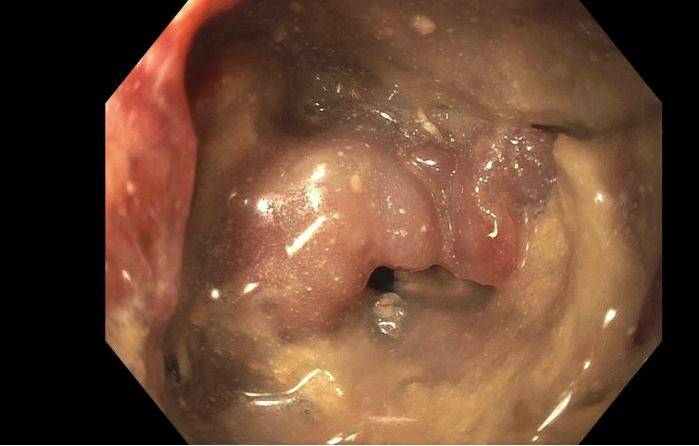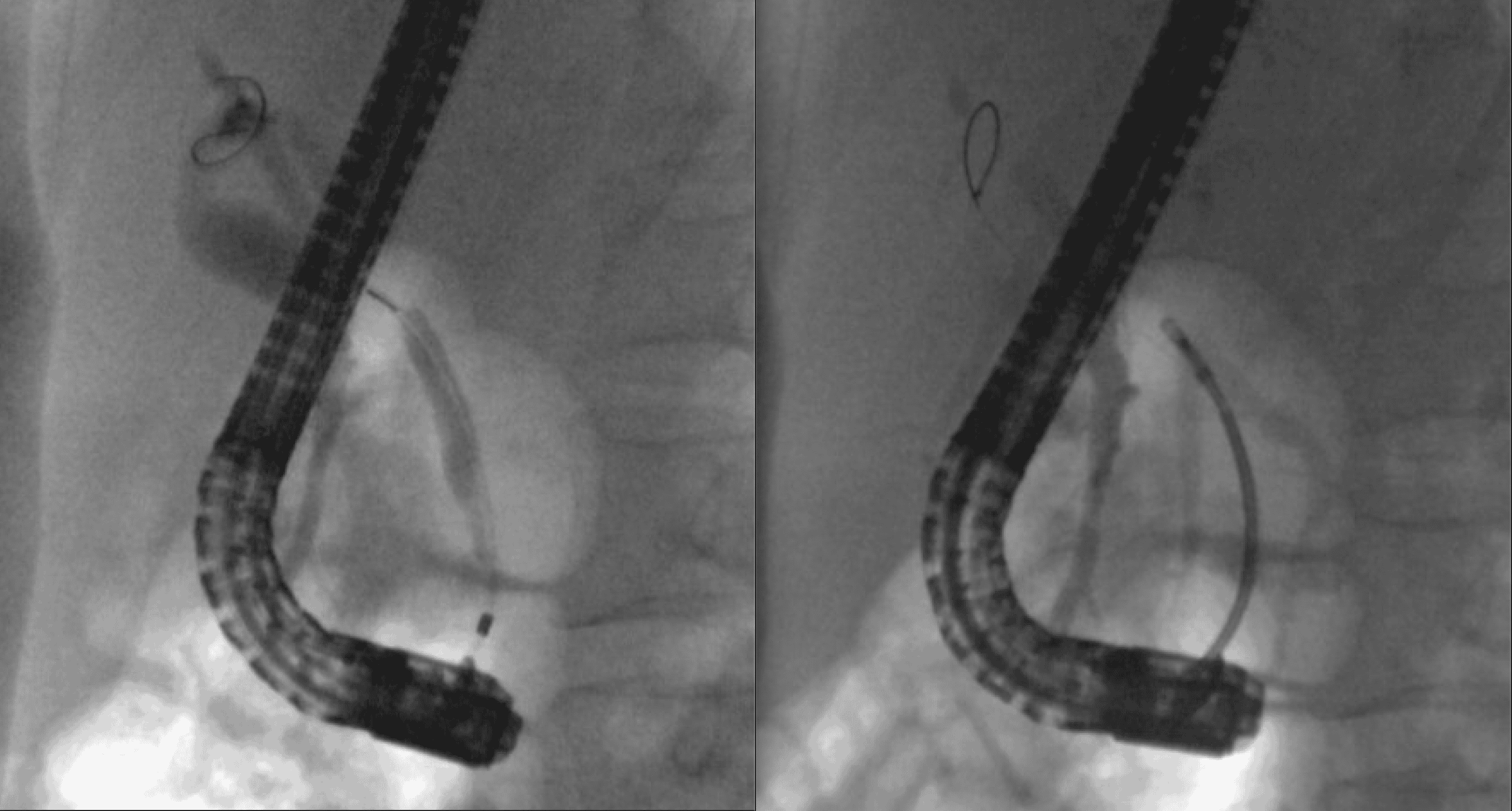Tuesday Poster Session
Category: Biliary/Pancreas
P4472 - A Rare Case of Rectal Squamous Cell Carcinoma Metastatic to the Bile Duct
Tuesday, October 28, 2025
10:30 AM - 4:00 PM PDT
Location: Exhibit Hall

Khalid Ahmed, MD (he/him/his)
University of Minnesota
Minneapolis, MN
Presenting Author(s)
Khalid Ahmed, MD1, Abubaker Abdalla, MD2, Nirjhar Dutta, DO, MS3, Nouran Keshk, MD4, Nabeel Azeem, MD1
1University of Minnesota, Minneapolis, MN; 2University of Minnesota Medical Center, Minneapolis, MN; 3University of Minnesota Medical School, Minneapolis, MN; 4Mayo Clinic, Rochester, MN
Introduction: Squamous cell carcinoma (SCC) of the gastrointestinal tract (GI) tract is rare outside of the esophagus and anus. SCC of the biliary tree is exceedingly uncommon and accounts for ~2% of biliary tree malignancies, while rectal SCC comprises < 1% of rectal cancers. To our knowledge, metastatic rectal SCC involving the bile ducts has not been previously reported. We present a unique case of a patient with a recto-vaginal fistula and jaundice who was found to have biopsy-proven SCC in the rectum and bile duct.
Case Description/
Methods: A 47-year-old female with a past medical history of polysubstance abuse and untreated genital human papillomavirus (HPV) infection who was admitted to the hospital due to painless jaundice and passage of stool from the vagina for about three months prior to admission. Computed topography (CT) of the abdomen and pelvis showed evidence of a recto-vaginal fistula and diffuse dilation of proximal common bile duct (CBD) and intra-hepatic ducts. Endoscopic ultrasound showed a dilated CBD without a discrete mass. Endoscopic retrograde cholangiopancreatography (ERCP) revealed a CBD stricture; brushings and biopsies were obtained; the stricture was dilated, and a stent was placed (Figure 1.). Flexible sigmoidoscopy revealed a circumferential fungating rectal mass; biopsies were obtained (Figure 2.). Histopathology from both sites demonstrated SCC arising in a background of high-grade squamous intraepithelial lesions. Gynecologic oncology was consulted, and a diagnosis of metastatic rectal squamous cell carcinoma to the bile duct was favored, given a normal cervical examination aside from the presence of the recto-vaginal fistula. Plans were made to initiate chemotherapy +/- immunotherapy after a multidisciplinary discussion.
Discussion: This case highlights a rare presentation of SCC involving both the biliary system and rectum, an association not previously described in the literature. Given the absence of standardized treatment protocols for metastatic rectal SCC and the poor reported prognosis (~8% survival), a multidisciplinary approach to care is recommended to guide management and improve outcomes.

Figure: Figure 1. Common bile duct stricture on cholangiogram.

Figure: Figure 2. Rectal mass on flexible sigmoidoscopy.
Disclosures:
Khalid Ahmed indicated no relevant financial relationships.
Abubaker Abdalla indicated no relevant financial relationships.
Nirjhar Dutta indicated no relevant financial relationships.
Nouran Keshk indicated no relevant financial relationships.
Nabeel Azeem: Boston Scientific – Consultant.
Khalid Ahmed, MD1, Abubaker Abdalla, MD2, Nirjhar Dutta, DO, MS3, Nouran Keshk, MD4, Nabeel Azeem, MD1. P4472 - A Rare Case of Rectal Squamous Cell Carcinoma Metastatic to the Bile Duct, ACG 2025 Annual Scientific Meeting Abstracts. Phoenix, AZ: American College of Gastroenterology.
1University of Minnesota, Minneapolis, MN; 2University of Minnesota Medical Center, Minneapolis, MN; 3University of Minnesota Medical School, Minneapolis, MN; 4Mayo Clinic, Rochester, MN
Introduction: Squamous cell carcinoma (SCC) of the gastrointestinal tract (GI) tract is rare outside of the esophagus and anus. SCC of the biliary tree is exceedingly uncommon and accounts for ~2% of biliary tree malignancies, while rectal SCC comprises < 1% of rectal cancers. To our knowledge, metastatic rectal SCC involving the bile ducts has not been previously reported. We present a unique case of a patient with a recto-vaginal fistula and jaundice who was found to have biopsy-proven SCC in the rectum and bile duct.
Case Description/
Methods: A 47-year-old female with a past medical history of polysubstance abuse and untreated genital human papillomavirus (HPV) infection who was admitted to the hospital due to painless jaundice and passage of stool from the vagina for about three months prior to admission. Computed topography (CT) of the abdomen and pelvis showed evidence of a recto-vaginal fistula and diffuse dilation of proximal common bile duct (CBD) and intra-hepatic ducts. Endoscopic ultrasound showed a dilated CBD without a discrete mass. Endoscopic retrograde cholangiopancreatography (ERCP) revealed a CBD stricture; brushings and biopsies were obtained; the stricture was dilated, and a stent was placed (Figure 1.). Flexible sigmoidoscopy revealed a circumferential fungating rectal mass; biopsies were obtained (Figure 2.). Histopathology from both sites demonstrated SCC arising in a background of high-grade squamous intraepithelial lesions. Gynecologic oncology was consulted, and a diagnosis of metastatic rectal squamous cell carcinoma to the bile duct was favored, given a normal cervical examination aside from the presence of the recto-vaginal fistula. Plans were made to initiate chemotherapy +/- immunotherapy after a multidisciplinary discussion.
Discussion: This case highlights a rare presentation of SCC involving both the biliary system and rectum, an association not previously described in the literature. Given the absence of standardized treatment protocols for metastatic rectal SCC and the poor reported prognosis (~8% survival), a multidisciplinary approach to care is recommended to guide management and improve outcomes.

Figure: Figure 1. Common bile duct stricture on cholangiogram.

Figure: Figure 2. Rectal mass on flexible sigmoidoscopy.
Disclosures:
Khalid Ahmed indicated no relevant financial relationships.
Abubaker Abdalla indicated no relevant financial relationships.
Nirjhar Dutta indicated no relevant financial relationships.
Nouran Keshk indicated no relevant financial relationships.
Nabeel Azeem: Boston Scientific – Consultant.
Khalid Ahmed, MD1, Abubaker Abdalla, MD2, Nirjhar Dutta, DO, MS3, Nouran Keshk, MD4, Nabeel Azeem, MD1. P4472 - A Rare Case of Rectal Squamous Cell Carcinoma Metastatic to the Bile Duct, ACG 2025 Annual Scientific Meeting Abstracts. Phoenix, AZ: American College of Gastroenterology.
